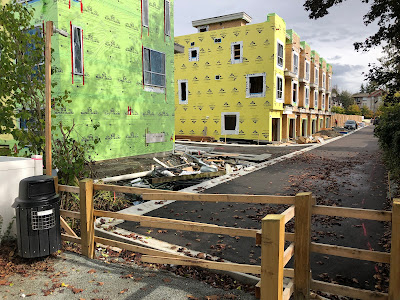Over the past few weeks, I've been out of town and taking a break from blogging, but I have been thinking a lot about housing and how we seriously move the needle to return housing prices to a normal level in Metro Vancouver.
The first question is, what is a normal level? In the CMHC report, "Housing Shortages in Canada: Solving the Affordability Crisis," the authors note that households in BC historically spent no more than 44% of their pre-tax income on housing.
Using Langley City, the average income for a household in 2020 was $89,400. About 50% of the households in Langley City make this income or more.
These households should be able to buy or rent housing at market rates built by for-profit developers. This isn't the case today, with many households spending 60% or more of their income on housing.
So, how do we drive down the cost of housing in a meaningful way in Metro Vancouver?
The first is to lower the cost of land. Most land within our Urban Containment Boundary is zoned for single-detached housing in Metro Vancouver. This zoning restriction puts a premium on land zoned for higher densities.
I did a straightforward search on Reator.ca in Langley City. The property at 20196 48 Avenue is selling for $149/sq. ft. Meanwhile, 20214 52 Avenue, a 5-minute walk down the street, is selling for $278/sq. ft. The 48 Avenue property is in a single-detached area, while 20214 52 Avenue is in a low-rise attached housing area.
Building a townhouse, excluding land, costs about $233/sq. ft. in Metro Vancouver. Increasing the land supply to accommodate townhouses will lower the land cost, driving meaningful savings for people buying or renting a home. This is simple supply and demand.
The provincial government understands this is a concern, so they will be requiring municipalities to allow up to four housing units per residential lot in BC. While I understand this, a much better approach to driving down land costs would be to enable a minimum FAR of 1.4 for all resident areas within the Urban Containment Boundary of Metro Vancouver. This would enable cost-effective land assemblies and the typical three-story townhouse format we see in Metro Vancouver. Municipalities cannot do this piecemeal, so it would have to be mandated or strongly encouraged by the provincial government to drive meaningful cost savings across Metro Vancouver.
We also know that borrowing money impacts the cost of building housing. The provincial and federal governments should help developers to get lower-interest loans for building market rental and ownership townhouses and apartments, not just below-market housing.
Another significant cost driver for housing is municipal parking requirements. Looking at the typical three-storey townhouse, about 1/3 of the square footage is for parking. We must remove minimum parking requirements. I know this can be tricky as parking is a third-rail issue in some communities. Still, many North American municipalities are removing or reducing parking requirements to reduce housing costs.
As they say, time is money, and waiting a year to go through the approval process at City Hall wouldn't cut it. The provincial government must set service-level targets that municipalities should meet and work with municipalities through UBCM to help us achieve those targets by providing support.
The home construction industry needs to become more productive. Simply put, the same amount of people working in the industry will need to build more housing units faster. The province must work with the industry to help improve productivity.
The final piece of the puzzle is to add transparency to buying new homes. Many people tell me, "Nathan, for all the cost savings you're talking about, developers will just take that as profit." This is why we should have updated disclosure statements for every new home. These statements should show the land costs, construction costs, development fee costs, financing costs, and profit per square foot for a new home. The province should also centrally track this information and make it publicly available to ensure developers are not exploiting folks.
I didn't talk about non-market housing in this post. We must build more of it, but lowering the cost of market housing will help the most people, the faster.


No comments:
Post a Comment